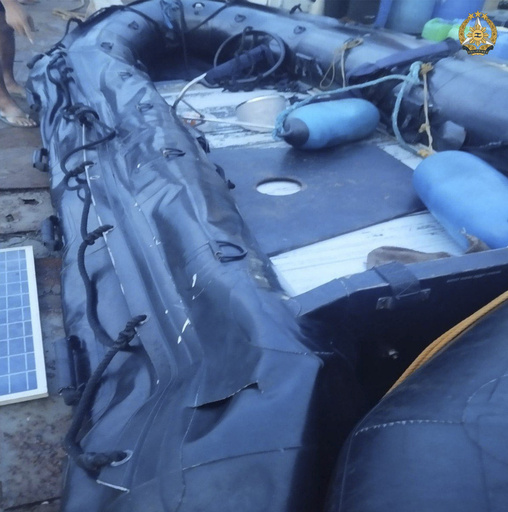MANILA, Philippines (AP) — The Philippine military chief demanded Wednesday that China return several rifles and equipment seized by the Chinese coast guard in a disputed shoal and pay for damages in an assault he likened to an act of piracy in the South China Sea.
Chinese personnel on board more than eight motorboats repeatedly rammed then boarded the two Philippine navy inflatable boats Monday to prevent Filipino navy personnel from transferring food and other supplies including firearms to a Philippine territorial outpost in Second Thomas Shoal, which is also claimed by Beijing, according to Philippine officials.
After a scuffle and repeated collisions, the Chinese seized the boats and damaged them with machetes, knives and hammers. They also seized eight M4 rifles, which were packed in cases, navigation equipment and other supplies and wounded a number of Filipino navy personnel, including one who lost his right thumb, two Philippine security officials told The Associated on Tuesday.
The two officials spoke on condition of anonymity because of a lack of authority to discuss the sensitive conflict publicly.
Video and photographs issued by the Philippine military Wednesday night show the chaotic faceoff at the shoal, with Chinese personnel onboard boats brandishing knives, axe and sticks while surrounding two Philippine navy supply boats beside Manila’s ship outpost. Sirens blare constantly as both sides yell at each other and the Chinese smash the Philippine navy boat with a pole and grab what appears to be a bag with a stick.
Pictures show a damaged Philippine navy boat with its side floaters slashed and deflated and another boat with its windshields and navigational screens shattered. A man displays a damaged cellphone.
“We are demanding that the Chinese return our rifles and our equipment and we’re also demanding that they pay for the damage they caused,” Gen. Romeo Brawner Jr., head of the Philippine armed forces, said in a news conference in western Palawan province, where he pinned a medal on the wounded navy officer.
“They boarded our boats illegally and seized our equipment,” Brawner said. “They’re now like pirates with this kind of actions.”
Armed with long knives and machetes, the Chinese coast guard personnel tried to beat the unarmed Filipinos, who resisted with their bare hands by parrying the blows and pushing back the Chinese, Brawner said. “Our objective is also to prevent war.”
Some of the Chinese pointed their knives at the Filipino navy personnel, he said.
China blamed the Philippines for the confrontation, saying the Filipino personnel “trespassed” into the shoal in defiance of its warnings.
“This is the direct cause of the incident,” Foreign Ministry spokesperson Lin Jian said in Beijing. “The Chinese coast guard at the scene has taken professional law-enforcement measures with restraint aimed at stopping the illegal supply mission by the Philippine vessels and no direct measures were taken against the Philippine personnel.”
The United States renewed a warning Tuesday that it is obligated to defend the Philippines, a treaty ally.
Second Thomas Shoal, part of the disputed Spratly Islands, has been occupied by a small Philippine navy contingent aboard a grounded warship that has been closely monitored by China’s coast guard and navy in a yearslong territorial standoff. China claims the South China Sea virtually in its entirety.
There is fear that disputes in the South China Sea, long regarded as an Asian flashpoint, could escalate and pit the United States and China in a larger conflict. Aside from China and the Philippines, Vietnam, Malaysia, Brunei and Taiwan have conflicting territorial claims in the busy waterway.
Since last year, hostilities between China and the Philippines have escalated in the disputed waters, particularly in Second Thomas Shoal, which is less than 200 nautical miles (370 kilometers) from the Philippine coast and where the BRP Sierra Madre, now encrusted with rust, was deliberately grounded in 1999 to create a territorial outpost. The ship remains an actively commissioned military vessel, meaning an attack on it could be considered by the Philippines as an act of war.
This website uses cookies so that we can provide you with the best user experience possible. Cookie information is stored in your browser and performs functions such as recognising you when you return to our website and helping our team to understand which sections of the website you find most interesting and useful.
